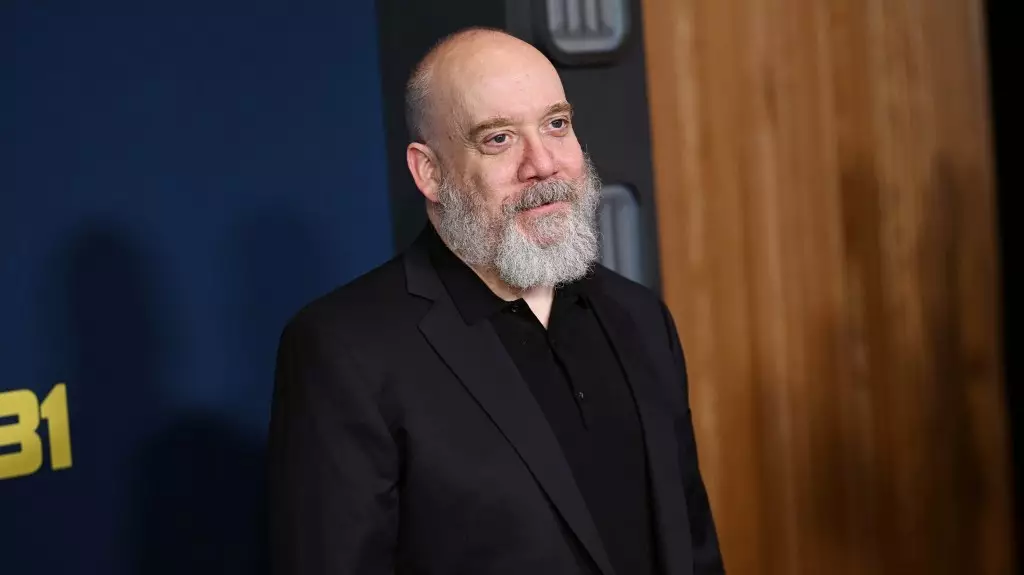When a beloved figure passes away, their absence reverberates like the tolling of a bell, echoing through the hearts of those who admired them. Such is the case with the recent death of Dame Maggie Smith, a cherished talent in the film and theater landscape, whose role as Violet Crawley shaped the essence of *Downton Abbey* into a cultural phenomenon. Paul Giamatti, reflecting on his experience in *Downton Abbey: The Grand Finale*, captures the essence of this sentiment perfectly. Giamatti’s words spotlight the poignant reality that while the film continues, the specter of Smith’s absence lingers, casting a shadow over the joyous moments once attributed to her nuanced performance.
Giamatti’s remarks about not being able to share the screen with Smith again resonate deeply. The film industry often glorifies the idea of collaboration, yet the painful truth is that no performance can truly enrich itself in the absence of an indelible artist like Smith. Her influence transcended her character, and the loss bears heavily on all who interacted with her—creating a layered experience for anyone involved in this project, where laughs and tears intertwine in a bittersweet narrative.
A Surprising Return to Familiar Grounds
Giamatti’s unexpected re-entry into the *Downton* universe serves as a compelling reflection of how stories evolve, even for characters who seem to linger on the periphery. His portrayal as Harold Levinson, who previously graced the series for a single Christmas special, appeared inconsequential at the time. However, Giamatti reveals that he has been granted a more substantial role in the latest film, where his character now impacts the storyline significantly. This transition mirrors the very essence of life itself; sometimes, the most understated roles become pivotal in our narratives and relationships.
While Giamatti may have approached this second opportunity with trepidation, one cannot help but admire the creative courage embedded within the decision to reintroduce him. It challenges the conventional wisdom that only main characters can drive a story forward, proving that even a fleeting presence can alter the trajectory of events. This brave reimagining aligns impeccably with the center-left liberal ethos, emphasizing not the status of an individual but their potential for growth and transformation.
A Heartfelt Tribute to a Legendary Soul
At its core, *Downton Abbey: The Grand Finale* represents much more than a continuation of a beloved series; it stands as a tribute to its fallen matriarch, Maggie Smith. As noted by executive producer Gareth Neame, the film’s narrative has taken on an intensified meaning in the wake of her passing. The loss felt by the characters resonates deeply with the audience, blurring the lines between fiction and reality. Acknowledging grief, especially in a public forum, offers a unique opportunity to honor lives well-lived, even as tragedies unfold.
To witness actors navigating the interplay of personal and collective mourning provides a canvas for reflection. The acknowledgment of Smith’s absence lends depth to the experience, inviting viewers to connect not just to the story unfolding onscreen, but also to the narratives within their lives—an act that feels remarkably courageous. The poignant connection between the characters’ grief and the actors’ own sorrow yields a layered emotional landscape, where tragedy gives way to nostalgia and reverence.
A Legacy of Community and Collaboration
As the release date for *Downton Abbey 3* approaches, fans and newcomers alike await the film that seeks to capture not just the essence of a long-beloved series, but also the enduring spirit of its cast. With a filmography enriched by illustrious talent and transformative narratives, *Downton Abbey* continues to demonstrate the capacity of storytelling to foster connections, act as a sanctuary for emotions, and challenge traditional notions of legacy.
In a political climate often defined by division, this celebration of community through shared grief transcends the ever-present barriers of our times. It reminds us that art has a unique power to unify and heal. Ultimately, this collaborative endeavor emerges not merely as entertainment but as a significant inquiry into what it means to honor those we have loved and lost, woven effortlessly into the fabric of our shared narrative.


Leave a Reply